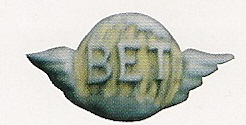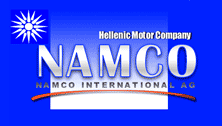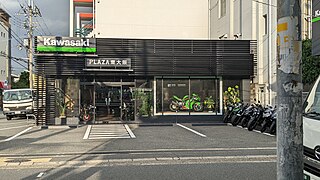
Audi AG is a German automotive manufacturer of luxury vehicles headquartered in Ingolstadt, Bavaria, Germany. A subsidiary of the Volkswagen Group, Audi produces vehicles in nine production facilities worldwide.

Cadillac Motor Car Division, or simply Cadillac, is a division of the American automobile manufacturer General Motors (GM) that designs and builds luxury vehicles. Its major markets are the United States, Canada and China. Cadillac models are distributed in 34 additional markets worldwide. Historically, Cadillac automobiles were at the top of the luxury field within the United States, but have been outsold by European luxury brands including BMW and Mercedes since the 2000s. In 2019, Cadillac sold 390,458 vehicles worldwide, a record for the brand.

Reliant Motor Company was a British car manufacturer based in Tamworth, Staffordshire, England. It was founded in 1935 and ended car production in 2002, the company had been known as "Reliant Motor Company" until the 1990s when it became "Reliant Motors" and then finally became "Reliant Cars LTD" after production had ended of the Robin as the company was restructured to be a car import business. It is now a dormant company and the only entity left is a separate parts company created called "Reliant Partsworld" which produces parts for Reliant vehicles.

The Continental Mark II is an ultra-luxury coupé that was sold by the Continental Division of Ford for the 1956 and 1957 model years. The first product line of Continental, the Mark II was developed as the worldwide flagship vehicle of Ford Motor Company. Developed as a successor for the 1939–1948 Lincoln Continental, the Mark II derived its nameplate from European manufacturing practice, denoting a second generation of the model family; Ford would later use this nomenclature for the Mark Series of flagship personal luxury cars.

The Ford Transit is a family of light commercial vehicles manufactured by the Ford Motor Company since 1965, primarily as a cargo van, but also available in other configurations including a large passenger van, cutaway van chassis, and a pickup truck. The vehicle is also known as the Ford T-Series, a nomenclature shared with Ford's other light commercial vehicles, the Ford F-Series trucks, and the Ford E-Series chassis. As of 2015, 8 million Transit vans have been sold, making it the third best-selling van of all time and has been produced across four basic platform generations, with various "facelift" versions of each.

Suzuki Motor Corporation is a Japanese multinational mobility manufacturer headquartered in Hamamatsu, Shizuoka. It manufactures automobiles, motorcycles, all-terrain vehicles (ATVs), outboard marine engines, wheelchairs and a variety of other small internal combustion engines. In 2016, Suzuki was the eleventh biggest automaker by production worldwide. Suzuki has over 45,000 employees and has 35 production facilities in 23 countries, and 133 distributors in 192 countries. The worldwide sales volume of automobiles is the world's tenth largest, while domestic sales volume is the third largest in the country.

Front-wheel drive (FWD) is a form of engine and transmission layout used in motor vehicles, in which the engine drives the front wheels only. Most modern front-wheel-drive vehicles feature a transverse engine, rather than the conventional longitudinal engine arrangement generally found in rear-wheel-drive and four-wheel-drive vehicles.

The Land Rover Defender is a series of British off-road cars and pickup trucks. They consistently have four-wheel drive, and were developed in the 1980s from the original Land Rover series which was launched at the Amsterdam Motor Show in April 1948. Following the 1989 introduction of the Land Rover Discovery, the term 'Land Rover' became the name of a broader marque, and thus no longer worked as the name of a specific model; thus in 1990 Land Rover renamed the 90 and 110 as Defender 90 and Defender 110 respectively. The 127 became the Defender 130.

The Ford F-Series is a series of light-duty trucks marketed and manufactured by Ford Motor Company since the 1948 model year. The F-Series is marketed as a range of full-sized pickup trucks positioned above the midsize Ranger but below the larger Super Duty in the Ford truck lineup. Alongside the F-150, the F-Series also includes the Super Duty series, which includes the heavier-duty F-250 through F-450 pickups, F-450/F-550 chassis cabs, and F-600/F-650/F-750 Class 6–8 commercial trucks.

The Reliant Robin is a small three-wheeled car produced by the Reliant Motor Company in Tamworth, England. It was offered in several versions over a period of 30 years. It is the second-most popular fibreglass car in history after the Chevrolet Corvette, with Reliant being the second-biggest British car manufacturer for a time.

A three-wheeler is a vehicle with three wheels. Some are motorized tricycles, which may be legally classed as motorcycles, while others are tricycles without a motor, some of which are human-powered vehicles and animal-powered vehicles.

Development of the automobile started in 1672 with the invention of the first steam-powered vehicle, which led to the creation of the first steam-powered automobile capable of human transportation, built by Nicolas-Joseph Cugnot in 1769. Inventors began to branch out at the start of the 19th century, creating the de Rivaz engine, one of the first internal combustion engines, and an early electric motor. Samuel Brown later tested the first industrially applied internal combustion engine in 1826. Only two of these were made.
Aptera Motors Corp. is an American crowd funded, pre-production startup company based in Carlsbad, California. It was originally founded in 2005 before liquidating in 2011. The company was relaunched by the original founders in 2019.

Biotechnia Ellinikon Trikyklon, or BET, was a small vehicle manufacturer founded in Athens by Petros Konstantinou. It was one of several manufacturers - the first appearing in the early 1940s - that converted BMW or other motorcycles into light utility three-wheelers. In 1965 it entirely designed and built a small five-seat passenger car with a BMW 125cc motorcycle engine. Although the type was certified, only one was built due to problems in availability of parts for further production. Following this design, three-wheeled truck models were developed and produced. A second passenger car model was designed and introduced in 1973, known as model 500, with a Fiat 500cc engine. With metal body, seating up to five passengers and featuring very good road handling, it was a rather advanced three-wheeler for its time. It was certified for production and 15 were built, of which one survives to this date in excellent condition. There were even talks with a South African company involving plans for exports or even transfer of production to that country, but they were never realized. The company ceased production in 1975.
Mego (ΜΕΓΚΟ) was a Greek light vehicle manufacturer, based in Trikala. Its first products, launched in 1947, were utility tricycles. In 1951, it began manufacturing motorized utility tricycles with 50–100cc engines and an unconventional design in which the solo wheel was located at the rear.

Attica was a brand name of vehicles produced by Bioplastic S.A., a company created in Moschato, Athens by Georgios Dimitriadis, a figure in Greek automotive history.

NAMCO is a Greek vehicle manufacturer. It was founded in 1972 by Kontogouris brothers.

The Land Rover Series I, II, and III, or simply the Land-Rover are compact British off-road vehicles, produced by the Rover Company since 1948, and later by British Leyland. Though inspired by the World War II jeep, the Land Rover immediately distinguished itself from all other cars. From launch, it was the first mass-produced civilian four-wheel drive car with doors, and an available hard roof. Contrary to conventional car and truck chassis, it used a sturdier fully box-welded frame. Furthermore, due to post-war steel shortage, and aluminium surplus, Land Rovers received non-rusting aluminium alloy bodies, favouring their longevity. In 1992, Land Rover claimed that 70% of all the vehicles they had built were still in use.

Kawasaki Motors, Ltd. is a Japanese mobility manufacturer that produces motorcycles, all-terrain vehicles, utility vehicles, watercraft, outboard motors, and other electric products. It derives its origins from Kawasaki Aircraft Industries, a subsidiary of Kawasaki Heavy Industries, and is rooted in the motorcycle, boat, and engine businesses. In 1953, they began manufacturing engines for motorcycles and have since produced products such as the Mach and Ninja series in motorcycles and the Jet Ski, which has become a generic term for personal watercraft. Until 2021, it was a division of Kawasaki Heavy Industries, known as the Kawasaki Aerospace Company (川策重工業汎用機カンパニー) and later the Kawasaki Motorcycle & Engine Company (川崎重工業モーターサイクル&エンジンカンパニー). In 2021, it was separated as Kawasaki Motors, Ltd, a wholly owned subsidiary of Kawasaki Heavy Industries.

Tropical is a Greek manufacturer involved in machinery and vehicle development and production. Its history is characteristic of a company which has made significant efforts to evolve in a country that effectively forbids production of locally developed passenger cars.

















